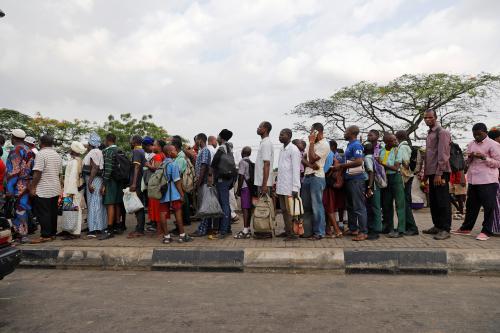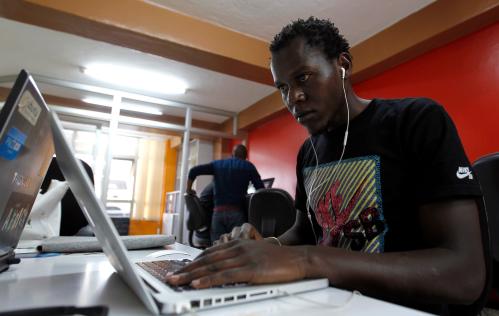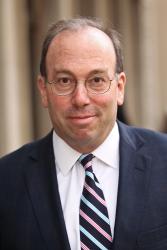“So, young people…my message to you is simple, keep believing, keep marching, keep building, keep raising your voice. Every generation has the opportunity to remake the world.”
-President Barack Obama, 2018 Nelson Mandela Annual Lecture, South Africa
Of the many statistics that define Africa’s complexity, this may be the most important one: With 200 million people between ages 15 and 24, Africa has the youngest population in the world. This demographic is expected to double by 2045. The question is whether Africa’s youth population is a “ticking time bomb,” a concern expressed by Zambia’s finance minister, Alexander Chikwanda, or, if the continent’s demography will contribute to sustained economic growth and diversification. Despite fast economic growth from 2000 to 2015, the absolute number of poor has increased in Africa and about 70 percent of young people live below the poverty line.
Engaging Africa’s youth is therefore critical, and has to become a top policy priority for African governments and other stakeholders. It is encouraging that some progress has been made. For example, the African Union’s theme for 2017 was “harnessing demographic dividends through investment in youth.” Aligned with this is recent Africa Growth Initiative research that contends governments need better policies and well-trained civil servants in order to enhance job creation, implement pro-poor policy interventions, and ensure effective public service delivery.
A step in this direction occurred last month in Johannesburg, when 200 young leaders from across Africa gathered for the inaugural meeting of the Obama Foundation Leaders: Africa program. The initiative’s goal is to equip these emerging leaders with the tools and inspiration they need to tackle some of the toughest challenges facing their communities, countries, and the continent. Working with President Obama and others, the young leaders took part in skills workshops, engaged with each other, and participated in a town hall with the president.
The gathering coincided with Mandela Day—a celebration of Nelson Mandela’s life—100 years after his birth. Despite the huge strides made by Mandela and others in Africa, the continent still struggles with corruption, slow-moving bureaucracies, and underperforming civil servants. These constraints have far-reaching effects. As President Obama noted in his remarks for the 2018 Nelson Mandela Annual Lecture: “In fact, it is in part because of the failures of governments and powerful elites to squarely address the shortcomings and contradictions of this international order that we now see much of the world threatening to return to an older, a more dangerous, a more brutal way of doing business.”
Despite these shortcomings, President Obama’s message was one of hope based on the belief that the next generation of leaders will utilize technology, innovation, and entrepreneurship to improve governance and opportunities. Indeed, a recent study by the African Union and the OECD found that government action is key to overcoming challenges related to growth, jobs, and inequalities. Elemental to this is the need for government institutions to deliver services efficiently and to create a regulatory environment that fosters development, economic growth, and job creation for today’s youth. Young leaders need to become change agents in the public and private sectors in order to ensure that the continent’s youth population contributes fully to the region’s progress. I have personally observed the positive impact of youth leadership initiatives in Africa, as a member of the Global Advisory Board of IREX, a nonprofit organization that manages YALI’s Mandela Washington Fellows program, and a board member of Emerging Public Leaders.
The Young African Leaders Initiative (YALI), created by the Obama administration and continued by the Trump administration, seeks to achieve this goal. In reality, YALI is one of the most innovative and impactful initiatives implemented by the U.S. in Africa; the fifth class of YALI’s Mandela Washington Fellows recently completed six weeks of leadership training in the U.S. and a summit in Washington with senior administration and congressional officials. Since YALI’s first class of fellows arrived in the U.S. in 2014, nearly 4,000 young Africans have participated in the program. Not only are the Fellows transformative leaders in the areas of public service, business and nonprofits, but more than 77 percent report sustained relationships with other fellows across the 49 countries of sub-Saharan Africa from which they are selected.
Another innovative program, Emerging Public Leaders (EPL), is a public service leadership organization providing high performing African youth with the tools and experiences necessary to become future public leaders and change agents. Through its highly selective Public Service Fellowship, EPL recruits and places talented university graduates into critical civil service positions for two years. Much like the U.S. government’s Presidential Management Fellows program, EPL provides future government leaders with the skills to think critically, act ethically, and ultimately drive good governance in civil service institutions.
Over the past decade, EPL has recruited and supported over 160 fellows through its flagship program in Liberia, the President’s Young Professionals Program, and its recently launched program, Emerging Public Leaders of Ghana. EPL’s longer-term goal is to expand its model beyond Liberia and Ghana to form a pan-African network of 500 public sector leaders by 2022.
Africa’s future is its youth. With nearly 60 percent of Africa’s 1.2 billion population under the age of 35, today’s youth face an unprecedented challenge to create and sustain meaningful change in their communities, countries, and across the globe. Empowering and investing in tomorrow’s leaders is a powerful way not only to honor the legacy of Nelson Mandela, but to work for a future that is secure and equitable.
Witney Schneidman is a member of the Global Advisory Board of IREX that manages YALI’s Mandela Washington Fellows program and a board member of Emerging Public Leaders.







Commentary
Smart power: Investing in youth leadership and development
August 17, 2018